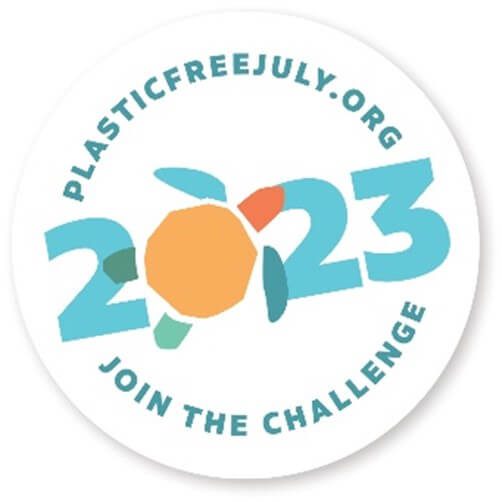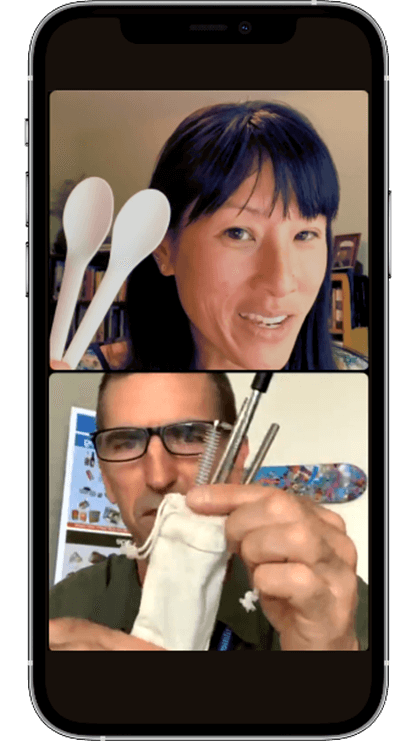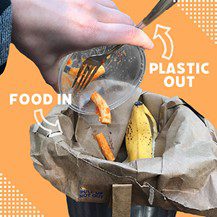
This summer, Seattle Public Utilities Solid Waste Division and our partners are taking part in an international campaign called Plastic Free July.
You might be asking yourself, what is Plastic Free July (PFJ) and how do I get involved? PFJ is an annual and ongoing global movement to encourage everyone to “be part of the solution to the plastic pollution problem for cleaner streets, oceans, and communities”. Reducing single-use (AKA disposable) plastics is a great way to get started! You can take the global challenge and find great resources from plasticfreejuly.org and towardszerowaste.se as well.
Read this blog then follow SPU social media on Facebook, Instagram, and Twitter this July to learn about a variety of topics including:
- How to reduce plastic use and repurpose the plastics you already have (simple swaps!)
- How to recycle plastics RIGHT! (Empty, Clean, & Dry is an important step!)
- Keeping plastics out of the compost (produce stickers have got to go!)
Come Talk Plastics in Person!
SPU and our partners, Tilth Alliance, Cedar Grove, Recology, and WM will be out in the community talking with customers about Plastic Free July! You can find us at the following spots (more to be added soon!)
- July 11th – Lifelong Thrift on Capitol Hill from 12-3pm with Recology
- July 14th – Northgate Community Center’s 17th Anniversary Celebration from 5-7:30pm with Master Computer Sustainability Stewards
- July 29th – Grocery Outlet in the International District with Recology (timing TBD)
Looking for a fun way to participate in Plastic Free July with SPU? Join the Global Challenge or try one of the following ideas.
Join other SPU customers, Seattle residents, and people around the globe who are choosing to refuse single-use plastics like shopping bags, straws, cups, and packaging to create a world without plastic waste. Visit plasticfreejuly.org to pledge to give up single-use plastics for a day, week, or even the whole month of July!
Here are some tips to get you started:
- What is one single-use plastic you can avoid this month? Say no to straws? Buy your groceries in bulk? Get plastic-free packaged produce at the farmers markets?
- What is one single-use plastic you can swap for a more durable option this month? Bringing your own cup, bag, containers, straw, and silverware will help make the swaps easy.
- How about reusing the plastics you already have one more time before you throw them out? Plastic bags make great trash liners and dog waste bags, and plastic yogurt containers are the perfect size for snacks on the go as reusable containers!
What are some ways I can reduce my plastic use in July and this summer? Ask Evelyn Shows You How!
Our staff on the Ask Evelyn Instagram Live Show are here to help you out! Check out these 60-second episode clips on limiting plastic at kids’ camps and BBQs!
S’more Tips on Reducing Single-Use Waste: Kids Camp Edition
Sending your little ones to camp this summer, but find yourself overwhelmed with single-use snack packaging? And what about those art projects they’re bringing home? See what our waste experts have to say about reducing plastic camp waste!
Green Grilling: Reusable Goods for Your Next BBQ
This July you might be hosting a cookout for friends and family. Take a minute to learn some super simple tips on how to re-think this tradition by incorporating reusable items and reducing plastic waste!
How do I make sure the plastics I already have/used are being recycled? Glad you asked because we need your help!
When in Doubt, Find Out. Not sure if that item of plastic is recyclable or not in your blue recycling cart in Seattle? Check out the Where Does it Go? Tool if you are unsure whether a plastic item (or any item!) is recyclable. For plastics, that means not focusing on the number on the bottom, but on the shape and firmness like tubs, jugs, and bottles.
Empty, Clean, and Dry. Remember to clean out your recyclable plastics and keep them dry before putting them in your blue recycling bin. Give containers a good rinse and let them dry. Or if you can’t get them clean, put them in the garbage. Leftover food in plastic jars can create mold that can spread to other recyclables ruining them. Liquids in plastic bottles can ruin the fiber in the paper in a load, making it harder or unable to be recycled.
Keep Plastic Bags & Film Out. Do not put plastic bags or plastic wrap in your blue recycling cart and do not bag your recyclables. Thin plastics, like bags and wrap, get tangled in recycling equipment, and the processing facility must shut down. Stopping the equipment to remove the plastic slows processing down, driving up costs, and is a potential safety risk for workers. Go to bagandfilmrecycling.org to find a drop-off location near you. If that is not convenient, you can throw them out. See our Q&A on plastic bags and film if you have more questions.
Keep Plastics Out of Compost!
It is especially important to make sure to keep ALL plastics out of your compost or food and yard waste cart. Plastic bags, containers, and packaging should NEVER be put in the compost bin because they contaminate the finished compost people use on their lawns and gardens with plastics. Be sure to check for sneaky and small plastic items like twist ties, rubber bands, and produce stickers.
In May, for Compost Awareness Week, we shared a blog that touches on the importance of keeping plastics out of your compost and its impact on the environment.
Additionally, you can reduce your plastic use in gardening by buying durable tools in wood and metal or borrowing from a tool library, avoiding plastic weed barriers, and making plant markers out of rocks or sticks. And did you know, in Seattle you can put your clean, empty, and dry plastic plant or nursery pots in the recycling? A win for compost and recycling!
For more information on reducing plastics in the garden, check out these tips from the Plastic Free Foundation.


